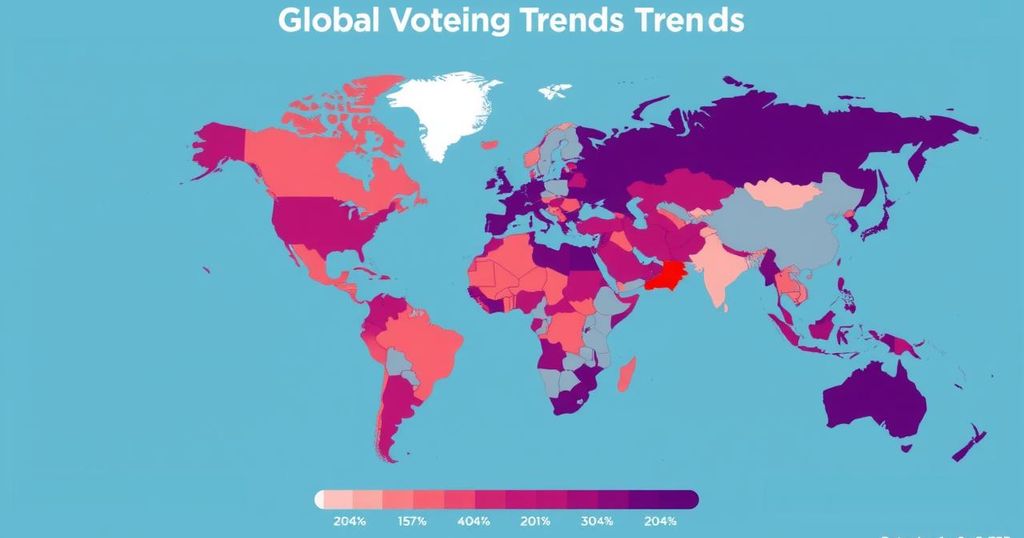Global Electoral Landscape: Key Outcomes of the 2024 Elections

The 2024 elections saw participation from over 70 countries, including significant democratic exercises in India and the United States. The global average voter turnout was 61%, with Rwanda recording the highest at 98.2%. Political incumbents were re-elected in places like Algeria, while new leaders emerged in various nations, reflecting shifting political tides and voter sentiments. Notably, Trump won the presidency in a polarizing U.S. election, and Bangladesh experienced dramatic changes in political leadership due to public protests.
In 2024, over 70 countries across the globe participated in elections, including 27 European Union member states voting in parliamentary elections. These events engaged a collective population of approximately four billion individuals, representing nearly half of the world’s population. The largest democratic exercise occurred in India, where 637.4 million citizens participated in a multi-phase electoral process. Voter turnout varied globally, averaging 61 percent, with Rwanda achieving the highest at 98.2 percent and Tunisia the lowest at 28.8 percent. Significant political shifts were observed; for instance, India’s Prime Minister Narendra Modi’s Bharatiya Janata Party fell short of a majority for the first time in a decade, and in Indonesia, Prabowo Subianto won the presidency with 59 percent of the vote after previous failures. Notably, Donald Trump emerged as the Republican candidate in the United States, winning against Kamala Harris after Joe Biden opted not to run.
Incumbent leaders were re-elected in several countries, including Algeria and Venezuela, while new leaders took charge in countries like Austria and Botswana. In an unprecedented political shift, Sheikh Hasina resigned in Bangladesh following widespread protests against her authoritarian regime, resulting in the appointment of Nobel Laureate Muhammad Yunus as interim leader. Furthermore, Syria witnessed the collapse of Bashar al-Assad’s rule after years of civil strife, signaling a significant change in governance in a long-turbulent region. Overall, the elections reflected varied results influenced by regional politics, social movements, and economic conditions, shaping the future governance of participating nations.
The 2024 election cycle featured a significant number of democracies engaging citizens in the electoral process, which is crucial for the functioning of various states, particularly in maintaining political stability and addressing public grievances. The collective turnout across continents highlighted regional variations in civic engagement, influencing governance dynamics in nations ranging from India to Rwanda. The political landscape was further affected by both long-standing incumbents facing scrutiny and new leaders yearning for change amidst societal pressures, particularly in nations with histories of political repression and conflict. This period also illustrated how elections can serve as a barometer for public sentiment, offering insights into the political trajectory of different countries.
In conclusion, the elections of 2024 underscored the complex political landscape worldwide, marked by a mix of incumbents retaining office and new leaders emerging amid calls for change. Crucial political shifts were observed in major democracies, reflecting the evolving dynamics of voter engagement and the impacts of underlying social issues. The diverse outcomes signal significant implications for the governance and future political stability in the countries involved, demonstrating the power of the electorate in shaping government.
Original Source: www.aljazeera.com






